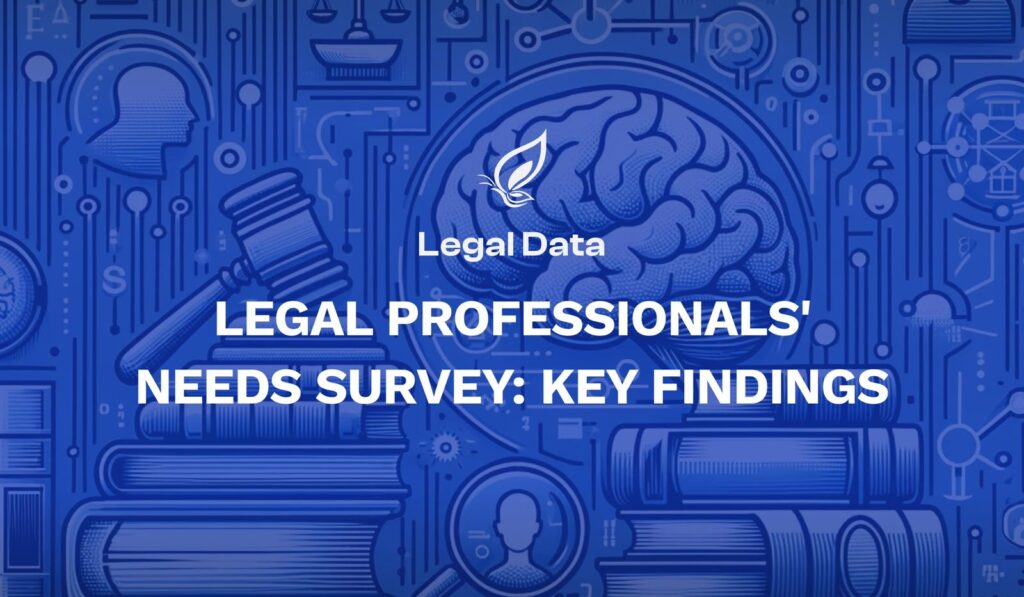In an extensive effort to tailor its services to the specific needs of legal professionals, Legal Data, the provider of an innovative legal research platform, has conducted over 80 Customer Development Interviews (CustDevs) with practitioners across 11 countries.
This initiative was aimed at gathering in-depth insights into the preferences and challenges faced by legal professionals in their daily research activities.
What are Key Findings from Legal Professionals?
- Research System Usage
Findings reveal that nearly 89% of legal professionals use legal research systems daily, with the rest 11% engaging three to four times weekly.
74% of the respondents spend at least 1.5-2 hours a day using legal research systems, while the remaining 26% spend about one hour or less. Their focus is primarily on case searches within specific legal areas, employing advanced filters for more refined results.
- Challenges with Existing Platforms
A common frustration among lawyers is the lack of in-depth resources like detailed graphs, templates, and academic materials. They also point out the challenge of finding up-to-date and relevant information.
The design of these platforms tends to feel somewhat outdated, and the requirement for year-long subscriptions is seen as a major drawback.
- AI Adoption in Legal Practice
Awareness of AI tools among legal professionals is notably high, with approximately 72% of respondents indicating familiarity with technologies such as Chat GPT. Despite this awareness, active utilisation of AI in legal work remains relatively low, with less than 27% incorporating these tools into their daily practice. The majority of this usage is focused on text editing tasks, rather than on more complex legal functions. Furthermore, a mere 3% of respondents reported using AI tools on a daily basis.
Some scepticism persists regarding AI’s capability to comprehensively grasp complex legal issues, ensure the accuracy and reliability of facts, maintain privacy and data security, and offer the essential human element.
- Delegating Work to AI
While there’s a willingness to delegate low-risk tasks to AI, such as case law research and drafting standard contracts, most lawyers emphasise the need for human oversight and double-checking, especially for nuanced tasks.
- Searching for Lawyers and Networking
A significant finding is that as a primary method, 100% of respondents rely on personal connections when searching for lawyers. If the search within personal connections was unsuccessful, other tools that are often used are LinkedIn, Google and bar association listings.
More than half of the surveyed lawyers have had unsuccessful experiences with lawyers whose qualifications did not meet their expectations or the expectations of their clients, highlighting a gap in effective networking tools.
- Platform Interface Preferences
Lawyers have shown a clear preference for platforms that are easy to navigate and straightforward. They particularly appreciate features like the ability to save and bookmark files, perform keyword searches, easily access previous searches, swiftly locate references to reliable sources and ability to download files.
Moreover, they value intelligent search capabilities that can interpret synonyms, legal terminology, and abbreviations effectively.
When it comes to design, they prefer neutral colour schemes that are pleasant to the eye, avoiding overly bright or distracting colours like neon pinks or toxic yellows.
- Additional Desired Features
Beyond the basics, lawyers are looking for platforms that offer innovative features such as predictive typing, automatic updates on relevant case law, and customizable alert systems for new legal developments in their areas of interest.
The ability to easily share and collaborate on documents with colleagues and clients was also noted as a desirable feature.
The survey highlights a pivotal shift in the legal services landscape. As legal professionals increasingly embrace AI and technology, the future of legal services is shaping up to be more efficient and user-centric. There’s a growing demand for intuitive, streamlined platforms that overcome current design and resource limitations, heralding an era of more advanced and responsive legal research tools.
Angelina Sevostyanova, CEO of Legal Data, says: “Nowadays, the fast-paced market requires advanced and effective tools that can revolutionize the legal industry. Only by leveraging cutting-edge technology and adapting to the preferences and needs of lawyers, we can be at the forefront of developing innovative platforms that are designed not only to streamline legal work but also to provide lawyers with enhanced time management capabilities.”








